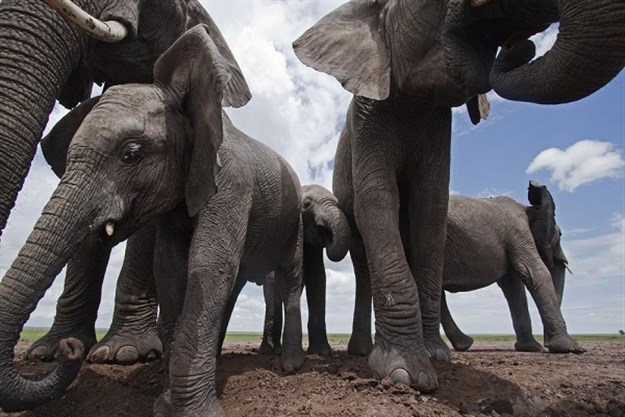
John Matano's Nampath Paper is just one of 17 Kenyan firms that process elephant dung to make high quality paper. Matano's paper is, according to the BBC, as good as paper made from traditional sources.
Elephants digest only about 45% of its highly fibrous herbivorous diet. Undigested fibre passes straight through them, creating dung that can be easily processed into paper. Or as Matano explained, "An average elephant eats 250kg of food each day. Out of that amount about 50kg of dung is produced, and 125 sheets of A4 paper can be produced from each 50kg."
This free, and constantly available renewable product has seen the birth of a new industry in East Africa. Kafe Mwarimo, manager at the Mwaluganje Elephant Sanctuary, said that the elephant dung paper industry has so far helped more than 500 local people pull themselves out of poverty.
Matano said their way of making paper saves the indigenous tree populations of nearby forests from being destroyed. "The business is very reliable, and has a promising future. It is important for poaching and illegal logging to go down to 0%."
The Kenya Wildlife Service (KWS), a government agency, has been full of praise for the efforts of the new paper industry. Paul Gathitu, KWS spokesman, said the industry has helped to protect the country’s remaining 7 000 elephants and helped reduce illegal logging.
"It is a good effort, it helps humans coexist with elephants. Lots of the paper products from elephant dung have been provided to us here at KWS."
Creation begins with the savannah grass that elephants feed on. It is that masticated fibre pulp that is the key ingredient of Nampath's paper. Matano explained the process: "After washing, clean fibres remain. Then the fibre is boiled for four hours in a vat to thoroughly ensure it is clean. Then after that, much of the process is similar to that of making regular paper."
Watch how people in Uganda produce paper out of elephant dung:
Jane Muihia, of paper manufacturer Transpaper Kenya, said paper from elephant dung is equal in quality to regular paper. She pointed out that the paper does not actually stink. "It goes through all the regular stages of manufacture. And in price it is almost the same."
Coffee made from beans rescued from elephant dung has, according to a story in the Daily Mail, a very floral aroma. With hints of chocolate. The taste has strong milk chocolate notes with a nutty undertone and hints of spices and red berries.
Black Ivory, the trade name for the coffee produced in Thailand, sells for $1 100 a kilogram, or R17 200, making it the most expensive cup of Joe you can wake up to. It is also only available to visitors at the Golden Triangle Asian Elephant Foundation.
The coffee is the brainchild of Thailand's Anantara Resorts. It insists that the beans are 'naturally refined' by the elephants in the conservation programme. Anantara uses 8% of sales to fund care for the animals, according to the news portal ABC News.
Watch how coffee lovers enjoy the Black Ivory in Thailand:
MediaClubSouthAfrica.com is hosted by the International Marketing Council of South Africa (IMC), the custodian of Brand South Africa. The site is a free service for all media professionals - journalists, editors, writers, designers, picture editors and more - as well as for non-profit organisations and private individuals. Its specific focus is on South Africa and Africa.
Go to: http://www.mediaclubsouthafrica.com/